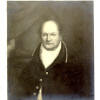 Old Stockbridge photo 191.
Old Stockbridge photo 191. William Amherst Barron was born in Petersham, Massachusetts on 10 January 1709. He was the son of Captain William Barron, a British Army Surgeon, who was a member of the medical staff for Lord William Amherst. Lord Amherst was the Commander of English forces during the conquest of Canada. It was Lord William Amherst after whom William Amherst Barron was named.
William Amherst Barron graduated and received an A.B. degree from Harvard College in 1787. John Quincy Adams graduated in the same class. Barron then went on to receive an A.M. degree in 1792. From 1793 until 1800, he served as a tutor at Harvard College.
On 8 June 1799, Barron declined an appointment with the 14th Infantry Regiment in the United States Army as a First Lieutenant. However, less than one year later, on 6 May 1800, he accepted an appointment as Captain in the Second Regiment of Artillerists and Engineers. From 1800 until 1802, Captain Barron served at various Atlantic posts. When the Army was reorganized in April 1802, he was transferred to the Corps of Engineers and assigned as a mathematics instructor to the newly formed United States Military Academy at West Point, New York.
The act establishing USMA provided for an engineer, in the rank of major, to be the Superintendent, and two assistant engineers, in the rank of captain, to serve as the educators of the Academy. Major Jonathan Williams was selected as Superintendent and Captain Barron served as one of the assistant engineers. He was appointed Acting Professor of Mathematics in July 1802. Until 1810, there was no formal prescribed course of studies at USMA. The mathematics instructors taught from Hutton's Mathematics, which was a compendium of elementary information on arithmetic, algebra, geometry, trigonometry, conic sections, analytical geometry and fluxions (calculus). The text was used as a guide for very elementary instruction which depended largely on the aptitude of the student. Captain Barron was described "as a man of social temper, fair abilities, and had a faculty for teaching."
In June 1803, Lieutenant Colonel Williams vacated the post of Superintendent. Captain Barron, as the senior officer of the Corps of Engineers at West Point, was ordered by the Secretary of War to act as Superintendent. Captain Barron served in this capacity, as well as being the mathematics instructor at the Academy, for the next twenty-two months. It was said that those were "two very dark years in the history of the Academy." Lieutenant Colonel Williams agreed to resume the Superintendency in April 1805. He vigorously applied himself to much needed reformatory measures. As the head of the Corps of Engineers, Lieutenant Colonel Williams was required to spend a great deal of time away from West Point. Unfortunately, Major Barron had to serve as the Acting Superintendent in Lieutenant Colonel William's absence. Major Barron was accused of grossly neglecting his duties, resulting in idleness and great irregularities among the cadets.
Charges were preferred against Major Barron by Lieutenant Colonel Gratiot, Corps of Engineers, on 28 December 1806, "for an almost neglect of the Military Academy, during the absence of Lieutenant Colonel Williams, thereby not advancing the interest and wishes of the public, and destroying the reputation." Major Barron resigned his commission on 14 June 1807, before he was brought to trial by a court martial.
William Amherst Barron was reappointed in the Army with the rank of Captain, Staff-Assistant Deputy Quartermaster General on 2 April 1813. He served in New York during the remainder of the War of 1812 until he was honorably discharged on 15 June 1815. He was reappointed Captain, Staff-Assistant Deputy Quartermaster General on 18 April 1818, and served on Quartermaster duty until 1 June 1821, when he was honorably discharged.
William Barron died on 19 July 1825.
References:
Annual Report of the Superintendent, 1896-1911, Washington: Government Printing Office, 1896, pages 39-40.
Cullum's Register, Volume I, pages 33-34.
Cullum's Register: Early History of the United States Military Academy,
Volume III, pages 487-510.
The Centennial of the United States Military Academy, 1802-1902, Volume I, Washington: Government Printing Office, 1904.
American State Papers. 8th Congress,
no 158 deals with travel expenses.
Brad Nirmess, Discipline:
The Foundation of USMA’s First Thirteen Years, a paper written for LD720 The
American Military Experience.and the United States Military Academy, a class
taught by the USMA History Department, 2001. Discusses the charges that the
unmarried Barron kept prostitutes in his quarters. Nirmess takes a strong
positive position. James William Kershner,
Sylvanus Thayer: a biography.
On p. 43 he writes that Barron was already teaching at WP before 1802. He is
confusing William Barron with the "one r" Baron.
Revised by VFR, September 25, 2010.